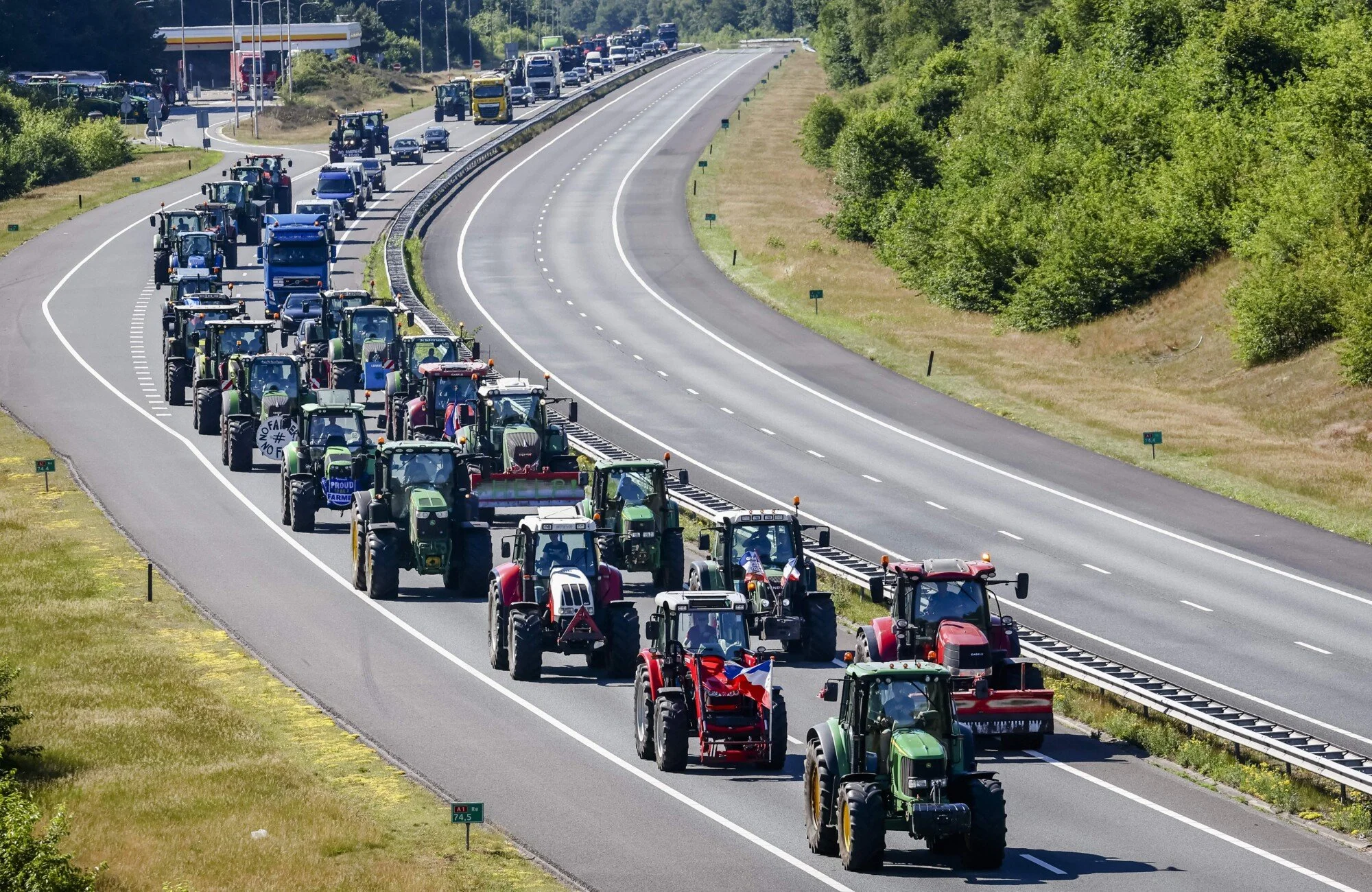The Difficult Balance Between Climate Policy and an Abundant Food Supply
Recently Sri Lanka has shown the real-world impacts of climate change policy with their ban on fertilizer imports undoubtedly contributing to a crop failure which forced the government to import food to feed its population. Meanwhile, farmers are protesting in the Netherlands against a Climate Change Policy that has the potential to put many farms out of operation and reduce the global food supply from the world’s second largest food exporter by value. There is also concern that farmers in the United States could face similar obstacles via a rule from the Securities and Exchange Commission (SEC) that will mandate emissions reporting for entire supply chains.
Image by Vincent Jannink
A good friend and mentor taught us to “Invert” the question or issue, turn it on it’s head, and ask the not so obvious questions. Could current climate change policy be creating unintended consequences? Food production and transportation supply chains are heavily dependent on fossil fuel resources and renewable technology alternatives do not appear to be ready for widespread adoption in food production supply chains… yet.
Sri Lanka
As the recent news has shown, the country is in chaos with the president fleeing after months of protests. This did not happen overnight and there are some notable bad decisions that have created a dire situation for the country’s citizens who now face a shortage of food, fiber, and fuel. A Bloomberg article written on April 27, 2022, “A Powerful Dynasty Bankrupted Sri Lanka in Just 30 Months” explained the situation a couple months before the president fled the country. Already dealing with a high debt load the President reduced the value-added tax to 8% from 15%, lifted levies, and banned fertilizer imports. The decision to ban commercial fertilizer inputs and transition to 100% organic farming seems to have contributed to the dire situation as “around a third of the labor force and 8% of gross domestic product- faced – disruptions. The paddy harvest failed, forcing the government to import rice and start an expensive food aid program to support devastated farmers.” These policy decisions slowly depleted the country’s cash reserves and prevented the imports of essential goods such as food and fuel leading to the recent turmoil.
Another recent Bloomberg article written on April 29, 2022, “To Avoid Default, Sri Lanka Might Need to Get Tougher on Climate Change” highlights how climate change polices are being mandated via financing from one its lenders, Nordea Bank Abp, with the asset manager, Thede Ruest, outlining targets from the Paris Agreement1 stating that “Sri Lanka has the unique chance to become the first country that has all its international bonds aligned to the Paris agreement”.
Could this happen elsewhere for other countries being offered agreements with creditors requiring climate change policies as a term for finance or face defaulting on their international debt? Will policies such as 100% organic farming prevent a country from producing sufficient food within its borders or will the country have to import essential goods? Are these measures actually reducing carbon emissions or just displacing them elsewhere? What can we learn from it all?
Netherlands
A similar fate may take place in the Netherlands if the recent measures introduced by the Dutch Parliament become enforced. The policy aims to reduce their emissions of nitrogen oxide and ammonia by the year 2030 under a plan to put in place drastic measures that will reduce farmer’s use of fertilizer, reduce livestock by 30%, and in some areas the livestock reduction could be as high as 70%.
The recent protests are gaining attention and what is alarming is the impact that this policy decision could have on the farmers of the Netherlands. An article from the Washington Examiner, “Dutch farming protests spread across EU, highlighting costs of climate goals”, explains that not only would it force many farmers to scale back production quickly, but many may be forced to shut down their operations; especially those farmers in areas where cuts could reach as high as 70%. This could have a dramatic impact on domestic production for Dutch farmers and the resulting exports that feed many other nations.
It is interesting that a country ranked as one of the world’s largest agricultural exporters could possibly have such an imposing policy passed that could force farmers to shut down operations. For those that stay in operation, productivity and yields could very likely decrease displacing production to meet demand, perhaps reducing overall global supply. If production is shifted elsewhere, the environmental impacts could be more dire, such as converting forested land to farmland in developing countries or incorporating inefficient agricultural practices that might, generate even more emissions… or unintended consequences.
Also, does this policy make sense for a country that has a highly sophisticated agricultural sector already in place that is successfully reducing emissions? According to the Environmental Data Compendium from the Government of the Netherlands the emissions of nitrogen oxides and ammonia decreased 64% since 1990.
Source : Government of the Netherlands, Environmental Data Compendium, November 25, 2019
United States
The Enhancement and Standardization of Climate Related Disclosures for Investors rule was proposed this year by the SEC on March 21, and will in practice impose more regulations on farmers and ranchers. The proposed rule requires registrants (those registered with the SEC) to disclose direct and indirect emissions. There are 3 scopes of emissions with scope 1 being direct greenhouse gas (GHG) emissions from operations owned or controlled by the registrant, scope 2 being indirect GHG emissions from the generation of purchased or acquired electricity by the registrant, and scope 3 being indirect GHG emissions that occur in the entire value chain of the registrant. The scope 3 emissions reporting will have the greatest impact on farmers and ranchers if the proposed rule is passed.
The Farm Bureau brought up many implications that this proposed rule will have on farmers and ranchers across the country. If the regulations are imposed, many farmers and ranchers will lack the necessary knowledge or access to compliance officers and lawyers to handle requirements imposed by the SEC. The proposed rule will impose an additional regulatory burden on farmers to actively monitor and record daily emissions. Additional hurdles include how emissions should be reported and calculated? Is there a standard methodology that everyone will use? Will carbon credits be considered? Will the farmer have privacy on reporting as most farmers and ranchers are not public companies or corporations? For those that are unable to comply, will it have further reaching unintended consequences ?
In practice, this proposed rule has the potential to positively affect Climate Change as well as the potential to negatively affect the food supply chain which may have… unintended consequences.
Concluding thoughts
Investment funds are rapidly incorporating ESG goals into their mandates and thus facilitating Climate Change measures through their investments. In the case of Sri Lanka, one of its lenders mandated Climate Change Policy as a condition to disburse funds. The Netherlands is facing a proposed Climate Change Policy that will reduce crop and livestock production in the country and potentially force many farmers out of business. The proposed SEC Climate Rule has the potential to disrupt agricultural supply chains and increase regulatory burden on farmers and ranchers.
Addressing Climate Change may be necessary, but those charged with creating Policy must take into consideration all of the potential impacts, not only on the farmers and ranchers but also on the human population that relies on food, fiber, and fuel from them. Hopefully the recent events in Sri Lanka and the current protests in Netherlands will help guide policy makers in carefully considering all of the ramifications, to invert the issue and look more closely and deliberately into the potential impacts their policies have and those that may be impacted in the future.
The only way to herd cattle quickly, is slowly.


